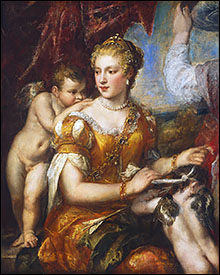|
|
|
|
 Fulke Greville Fulke Greville

Titian and follower,
Venus Blindfolding Cupid, 1570.
from
Cælica
by Fulke Greville
SONNET LXI
CAELICA, while you doe sweare you loue me best,
And euer lovèd onely me,
I feele that all powers are opprest
By loue, and loue by Destinie.
For as the child in swadlin-bands,
When it doth see the nurse come nigh,
With smiles and crowes doth lift the hands,
Yet still must in the cradle lie:
So in the boate of fate I rowe,
And looking to you, from you goe.
When I see in thy once-belouèd browes,
The heauy marks of constant loue,
I call to minde my broken vowes,
And child-like to the nurse would moue;
' But Loue is of the phoenix-kind,
' And burnes itselfe, in self-made fire,
' To breed still new birds in the minde,
' From ashes of the old desire:
' And hath his wings from constancy,
' As mountaines call'd of mouing be.
Then Caelica lose not heart-eloquence,
Loue vnderstands not, 'come againe:'
Who changes in her own defence,
Needs not cry to the deafe in vaine.
Loue is no true made looking-glasse,
Which perfect yeelds the shape we bring;
It vgly showes vs all that was,
And flatters euery future thing.
When Phoebus' beames no more appeare,
'Tis darker that the day was here.
Change I confesse it is a hatefull power,
To them that all at once must thinke;
Yet Nature made both sweet and sower,
She gaue the eye a lid to winke:
And though the youth that are estrang'd
From mother's lap to other skyes,
Doe thinke that Nature there is chang'd,
Because at home their knowledge lyes;
Yet shall they see who farre haue gone,
That Pleasure speaks more tongues than one.
The leaues fall off, when sap goes to the root,
The warmth doth clothe the bough againe;
But to the dead tree what doth boot,
The silly man's manuring paine?
Vnkindnesse may peece vp againe,
But kindnesse either chang'd or dead,
Selfe-pittie may in fooles complaine;
Put thou thy hornes on others' head:
For constant faith is made a drudge:
But when requiting Loue is iudge.
|
Source:
Greville, Fulke. The Works in Verse and Prose Complete.
Vol III. Rev. Alexander B. Grosart, ed.
London: Private [Tiplady and son], 1870. 70-72.
 | to the Works of Fulke Greville |
Site copyright ©1996-2023 Anniina Jokinen. All Rights Reserved.
Created by Anniina Jokinen on February 1, 2007. Last updated on May 30, 2023.
|
|
The Tudors
King Henry VII
Elizabeth of York
King Henry VIII
Queen Catherine of Aragon
Queen Anne Boleyn
Queen Jane Seymour
Queen Anne of Cleves
Queen Catherine Howard
Queen Katherine Parr
King Edward VI
Lady Jane Grey
Queen Mary I
Queen Elizabeth I
Renaissance English Writers
Bishop John Fisher
William Tyndale
Sir Thomas More
John Heywood
Thomas Sackville
John Bale
Nicholas Udall
John Skelton
Sir Thomas Wyatt
Henry Howard
Hugh Latimer
Thomas Cranmer
Roger Ascham
Sir Thomas Hoby
John Foxe
George Gascoigne
John Lyly
Thomas Nashe
Sir Philip Sidney
Edmund Spenser
Richard Hooker
Robert Southwell
Robert Greene
George Peele
Thomas Kyd
Edward de Vere
Christopher Marlowe
Anthony Munday
Sir Walter Ralegh
Thomas Hariot
Thomas Campion
Mary Sidney Herbert
Sir John Davies
Samuel Daniel
Michael Drayton
Fulke Greville
Emilia Lanyer
William Shakespeare
Persons of Interest
Visit Encyclopedia
Historical Events
Field of the Cloth of Gold, 1520
Pilgrimage of Grace, 1536
The Babington Plot, 1586
The Spanish Armada, 1588
Elizabethan Theatre
See section
English Renaissance Drama
Images of London:
London in the time of Henry VII. MS. Roy. 16 F. ii.
London, 1510, the earliest view in print
Map of England from Saxton's Descriptio Angliae, 1579
Location Map of Elizabethan London
Plan of the Bankside, Southwark, in Shakespeare's time
Detail of Norden's Map of the Bankside, 1593
Bull and Bear Baiting Rings from the Agas Map (1569-1590, pub. 1631)
Sketch of the Swan Theatre, c. 1596
Westminster in the Seventeenth Century, by Hollar
Visscher's Panoramic View of London, 1616. COLOR
|
|